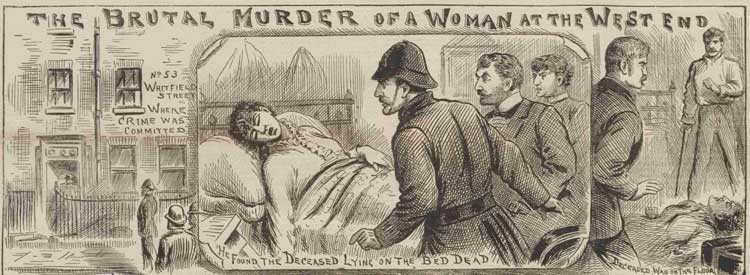The Southern Echo, in its edition of Monday 22nd June 1891, broke the news of a murder that had occurred in London:-
MURDER IN LONDON
A shocking murder was committed at 33, Whitfield Street, Tottenham-court-road, some time on Saturday night.
A woman lived there with a Frenchmen, Paul Acheton.
They retired to rest on Saturday night, but nothing being heard of them yesterday, the police were summoned, and the door of their room burst open.
The woman was then lying dead in a terribly battered state, being bruised from head to foot.
Dr. Lloyd, the divisional police surgeon, on being called, declared that death was undoubtedly due to violence.
HER PARAMOUR SUSPECTED
Suspicion at once fell on the woman’s paramour, who had absconded, leaving behind him a note acknowledging that he had committed the murder, and that his body would be found in the Thames.
A DESCRIPTION OF THE WANTED MAN
The police have issued the following description of the man:-” Aged 28; height, 5 feet 8 or 9 inches; complexion fair; eyes dark grey, hair and long moustache fair; grey jacket, striped trousers, and light brown hat. Speaks English fluently. Frequently with loose women.”
NO ARREST YET
In answer to inquiries at the Tottenham Court Road police station it was stated that, up to Sunday night, no one had been arrested for the crime.
The body of the murdered woman has been removed to the district mortuary, and, in due course, an inquest will be held by the coroner.
The police authorities are disposed to believe that the man may have carried out the threat contained in the note found in the murdered woman’s room, and committed suicide.

THE INQUEST
The Chard and Ilminster News carried a report on the inquest in its edition of Saturday, 27th June 1891
An inquest was opened in London on Tuesday on Elisabeth Stoffel. of 53, Whitfield Street, Tottenham, Court Road, who died from violence supposed to have been inflicted by Paul Acheson, with whom she lived.
A witness who lived in an adjoining room to that occupied by the deceased and the accused stated that they frequently quarrelled.
On Saturday night he slapped her face, and the witness and his wife went out to avoid hearing the quarell.
On their return, Acheson asked him for a light, and there appeared no reason for interference.
THE LAUNDRYMAN FOUND THE BODY
About 12 o’clock on Sunday the laundryman called, and not being able to make anyone bear, he went in, and the witness understood that he found the woman dead.
The witness identified a leg of a table produced by the police as having been in the accused’s hand on Saturday night.
MARIA CRUMHEZ’S TESTIMONY
Marie Crumhez, who lived with the last witness, stated that Acheson often ill-treated the deceased.
About four o’clock on Saturday morning she heard a noise as of Acheson putting his boots.
She heard nothing further until the laundryman came.
CONSTABLE PURGING’S EVIDENCE
Police Constable Purging, who was the first to enter the room with a man named Field, said that he found the deceased lying dead on the bed with bruises on the head, face, and arms.
THE LETTER
The following letter was found:-
“I do not know how it happened. I have a faint idea of fighting. I was mad drunk. She is dead, but I did not kill her. I am going to put an end to my life; yes, with despair. I would give my life for her could it bring her back again. My body will be found in the Thames.”
WILFUL MURDER
Dr. Floyd gave the opinion that the deceased was dead when placed on the bed, but the bruises had been inflicted during life.
The jury returned a verdict of wilful murder against Acheson, who has not yet been arrested.”
